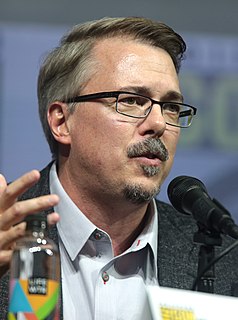A Quote by Lori Petty
When I was in the writers' room, all these writers were like, "Ugh, another star that they gave a writing-producing credit to." But then within like an hour, they were like, "You're really a writer." "Yeah, I really am. I'm a writer, and a director, and a producer, and an actor, and a painter, and I do all that stuff in the Lush Life." It was great.
Related Quotes
It feels as though a very disproportionate number of main characters are writers, because that's what the writer knows. Fair enough. But nothing bothers me more in a movie than an actor playing a writer, and you just know he's not a writer. Writers recognize other writers. Ethan Hawke is too hot to be a writer.
I definitely think of myself still as a writer first, and feel like - with the lucky exception of this - any acting opportunity I've gotten is usually because I was writing on it. This is like a wonderful vacation. If you've ever sat in a writers' room it's the most disgusting, tortuous place, so it's a treat to be treated like a movie actor.
I have known a handful of producers who actually were equal or superior to the writers with whom they worked. These producers were a new kind of nonwriting writer hatched by the movies - as Australia produced wingless birds. They wrote without pencils or even words. Using a sort of mime-like talent, they could make up things like writers.
There were always men looking for jobs in America. There were always all these usable bodies. And I wanted to be a writer. Almost everybody was a writer. Not everybody thought they could be a dentist or an automobile mechanic but everybody knew they could be a writer. Of those fifty guys in the room, probably fifteen of them thought they were writers. Almost everybody used words and could write them down, i.e., almost everybody could be a writer. But most men, fortunately, aren't writers, or even cab drivers, and some men - many men - unfortunately aren't anything.
A while back there was this fad where a big star [would get] a producing credit and you'd ask around, and people were like, "No, they didn't produce, they just took the credit." I was flabbergasted. So when I started, people were weirded out by the fact that I was like, "How long is our prep? I'll come a week before that." They were like, "We're not shooting for six weeks."
Television is a great job for a writer in the way that movies used to be, way before my time. Back when writers in Hollywood were on staff or under contract at any given studio and you'd write movie scripts and then the movies would get made within a few weeks, such that you could be a working writer in the movie business back in the '30s and '40s and '50s and have a hand in writing five or six movies a year that actually got produced. The only thing remotely like that in the 21st century here in Hollywood is working in the TV business.
In this day and age, if you're aspiring to be an actor, and you're putting all your eggs in one basket, you could be disappointed. I started out as an actor, but I forced myself to be a writer, even though I wasn't very good at it and had never written. I don't think I ever passed an English course in my life. My first 8 to 10 scripts were pretty horrendous, but I stayed at it until I eventually found a voice and a subject that people were interested in. So, I recommend that you go out and try to be as versatile as possible: writer, actor, producer and especially director.
With the Holocaust - I wonder if a lot of Jewish writers of my generation have felt this way - it feels really intimidating to approach it. I feel like so many writers who have either lived through it firsthand or were part of that generation where they were closer to the people who were in it have written so beautifully about it, so there's no lack of great books about it
I've always loved short stories. Even before I was a writer I was reading short stories - there were certain writers where I just felt like they could do in a short story what so many writers needed a whole novel to do, and that was really inspiring to me. Alice Munro, I felt that way about from an early time. Grace Paley.

































